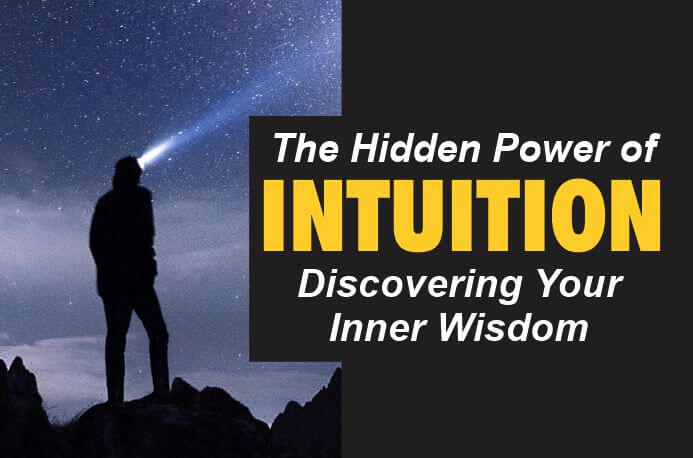Last updated on March 24th, 2024 at 10:29 am
Discover the power of intuition, and the depths of your inner wisdom, and learn how to harness the guiding force of decision-making and self-discovery.
Even though every human applies this gift of nature, not many understand it is as simple as knowing when a person is capable of doing harm or understanding a situation without thinking about it.
Intuitive discernment is inherent in humans and serves as a rudder, especially in times when you seem to be at a crossroads, to avoid the regrets of ignoring your intuition.
This is a comprehensive article on the ability to intuit bordering on its meaning, importance, types, benefits, development, and everything in between.
Recommended: Differentiating Sensing from Gut Feeling
Table of Contents
- What is Intuition?
- Instinct, Logic, or Intuition?
- Benefits of Intuition
- Signals and Signs of Intuition
- Types of Intuition
- How Does Intuition Work?
- The Science of Intuition
- What Research Has to Say About Gut Feeling
- The Brain Processes of Intuition
- How to Build Intuition
- Applying Intuition in Different Areas of Life
- Conclusion
- Frequently Asked Questions
What is Intuition?

It is the ability to understand or know something without needing conscious reasoning or logical proof.
It is a psychic energy in your mind that makes you understand something without the need for conscious thought.
Gut feeling is often described as an instinctual response that arises spontaneously and provides you with information that you cannot necessarily explain or articulate.
It can manifest in many forms, including physical sensations, emotions, images, dreams, and even spiritual experiences.
It is believed to be a powerful tool for decision-making, problem-solving, and creativity, as it enables you to tap into knowledge and insights that are beyond the reach of your conscious mind.
While intuitive ability is often associated with mystical or spiritual practices, it is also recognized as a legitimate psychological phenomenon that has been studied and documented by researchers in fields such as neuroscience and psychology.
Related: The Importance Of Cognitive Intuitiveness In Creative Thinking
Instinct, Logic, or Intuition?

Instinct, logic, and intuitiveness are all important aspects of decision-making, but they each have different strengths and weaknesses.
Here is a breakdown of each:
Intuition
| As described in the definition, it is a form of unconscious reasoning that allows us to access information and insights that may not be immediately apparent through logical or rational means. It is typically fast and holistic, allowing us to see patterns and connections that may not be immediately obvious. But, it can also be influenced by our own biases and emotions, and may not always be reliable or accurate. |
Instincts
| Instincts are innate, automatic responses to stimuli that are hardwired into our biology. They are typically fast and efficient, allowing us to react quickly in dangerous or life-threatening situations. However, instincts are not always rational or logical, and can sometimes lead us astray. More on instincts here. |
Logic
| Logic is the process of reasoning based on facts, evidence, and rules of inference. It is typically slow and deliberate, allowing us to carefully consider all the options and make a rational decision based on the available information. However, logic can also be limited by our own biases and preconceptions, and may not always take into account our emotional or intuitive responses. |
Related: Intuitive Ability vs Instinct: The Clear Differences
Benefits of Intuition
1. Self-awareness: Self-consciousness is crucial for understanding our true selves, including our thoughts, feelings, values, and desires. It enables us to make decisions that align with our authentic selves.
2. Inner Wisdom: Gut feeling manifests as inner wisdom, is a powerful tool for decision-making and problem-solving, providing valuable insights based on subconscious knowledge and experiences.
3. Decision-making: When making complex decisions, your inner wisdom considers intellect, and emotions, leading to choices aligned with our values and goals, promising satisfaction and fulfillment.
4. Authenticity: Gut feeling helps you connect with your true self, expressing authenticity and understanding your passions, interests, and purpose in life.
5. Emotional Wellbeing: Ignoring your gut feeling can lead to internal conflict and emotional distress, while listening to it promotes emotional well-being and peace.
6. Growth and Resilience: Engaging with your inner wisdom sustains ongoing self-discovery, personal growth, and resilience, enabling you to learn from experiences and adapt to challenges.
Related: How do I know if I am An introvert? 17 Sure Signs
Signals and Signs of Intuition
The experience of intuition varies from person to person, and it may express itself differently in different situations or contexts.
Developing and trusting your gut feeling can bring about a greater sense of self-awareness, better decision-making, and a deeper connection with your inner wisdom.
Here are ways it can manifest:
1. Gut Feelings
This is perhaps the most common manifestation of intuition. It is an intense and immediate feeling that something is either right or wrong, without any logical explanation.
For example, having a sudden sense of danger or knowing that a decision is the best choice, even if it cannot be logically justified.
2. Physical Sensations
It can manifest as physical sensations, such as a tingling sensation, goosebumps, chills, or a prickly feeling on the back of the neck.
These sensations may occur when something significant is about to happen or in the presence of certain people, places, or situations.
Related: How to Tap into Your Intuition
3. Dreams and Visions
It can appear in the form of dreams or vivid visions that provide insight or guidance.
Sometimes, intuitive messages may come through symbols, metaphors, or recurring images in dreams, offering valuable information about a particular situation.
4. Synchronicities
Also, it can show itself through synchronicities, which are meaningful coincidences that seem to defy conventional explanations.
These can be seen as signs or cues from the universe, guiding you towards the right path or confirming your intuitive hunches.
It can come as numbers on your watch. You might want to look up the time and you see, 11:11, 22:22, 10:10 etc.
This might happen so frequently that you want to give it a thought.
Related: Understanding Self-awareness
5. Creative Inspiration
It can emerge as a sudden burst of inspiration or a creative idea.
Artists, writers, and musicians often tap into their inner knowing when they experience a surge of creativity that goes beyond their rational thinking, leading to innovative and brilliant works.
6. Subtle Inner Voice
Gut feeling sometimes presents itself as a quiet, subtle inner voice or whisper in the mind.
It may provide guidance, wisdom, or solutions to problems.
This voice is often subjective and personal to each individual, acting as a source of inner wisdom and clarity.
7. Empathy and Emotional Resonance
A gut feeling can manifest as a deep sense of empathy or emotional resonance with others.
This can involve intuitively sensing their emotions, thoughts, or needs without them explicitly expressing them.
It allows you to understand others on a profound level, often leading to better connection and communication.
Related: Why Women’s Ability to Intuit Is More Powerful Than That Of Men

Related: Why The Best Leaders Rely On Their Gut Feeling
Types of Intuition
There are several different types of intuition, including:
- Emotional intuition: This involves being able to perceive and understand the emotions of others, as well as your emotional responses to different situations.
- Cognitive intuition: This involves using your past experiences and knowledge to make quick decisions and judgments in the present moment.
- Spiritual intuition: This involves a sense of connection to a higher power or universal consciousness, allowing you to tap into deeper truths and insights.
- Physical intuition: This involves being able to read and interpret physical sensations in your body, such as tension or discomfort, as a way of understanding your environment and making decisions.
- Creative intuition: This involves being able to generate new ideas and insights that are not immediately apparent through logical or rational means.
- Interpersonal intuition: This involves being able to perceive and understand the thoughts, feelings, and motivations of others, and to navigate social situations effectively.
- Claircognizance: This is knowing through inspiration or whatever means that is not learning-based. Simply put, you know something that you don’t know how or why you know it and it usually vanishes within a few seconds.
Related: What is Extraverted Intuitiveness?
- Clairaudience: This is the ability to hear extrasensory sounds in our heads, sometimes as a warning when we are about to be in danger. We might hear the word, ‘don’t’ when we are about to engage in an activity and we pause for a second to be sure we heard something.
- Clairsentience: This is the most rational of all the types of intuition. Clairsentients can feel other people’s feelings and energy. This is the type of discernment that can understand emotional energy that cannot be perceived by the five sense organs.
- Clairvoyance: This is the psychic ability to see images or actions in the future that are beyond the natural sensory manifestation. Seeing symbols, and numbers that are otherwise not visible to others is clairvoyance and is connected to the third eye.
Also Read: Gut Feelings He’s Cheating without Proof
How Does Intuition Work?

While its exact mechanisms are not fully understood, here are some of how gut feeling is believed to work:
1. Pattern Recognition
Our brains are wired to recognize patterns and similarities in our experiences, and to make connections between seemingly unrelated information.
It may involve the subconscious recognition of patterns and connections that we are not consciously aware of.
2. Emotional Processing
Your emotions play a powerful role in your decision-making processes, and intuitive ability may involve the subconscious processing of emotional cues and signals from your bodies and others.
Related: What is Extrasensory Perception?
3. Memory Retrieval
Your brain is capable of retrieving and integrating information from your past experiences, even if you are not consciously aware of those memories.
It may involve the retrieval and integration of relevant past experiences and knowledge.
4. Neural Processing
It may involve the subconscious processing and integration of neural signals from different parts of the brain, including those involved in perception, memory, and emotion.
5. Intuitive Leaps
These may involve sudden leaps of insight or understanding, in which our brains make connections and arrive at conclusions that we cannot fully explain.
Related: Strengths and Weaknesses of Introverted Intuitiveness
The Science of Intuition
The science behind gut feeling is a topic of ongoing research and debate, as it is a complex and multifaceted phenomenon that can be difficult to measure and study.
However, several areas of research shed light on the underlying processes of intuiting.
Let’s take a look:
1. Cognitive Neuroscience
One area of research is cognitive neuroscience, which studies the neural processes that underlie perception, attention, memory, and decision-making.
Studies have shown that intuitive activity may involve the subconscious processing and integration of neural signals from different parts of the brain, including those involved in perception, memory, and emotion.
Related: Gut Feeling or Relationship Anxiety?
2. Behavioural Psychology
Behavioural psychology examines decision-making and judgment in real-world scenarios.
Research also looks into the link between emotions and the ability to intuit, showing that emotional awareness enhances intuitive ability, especially in reading the emotions of others.
Additionally, expertise and experience play a role in intuitive discernment, as seen in domain-specific expertise.
The science behind the ability to intuit is multifaceted, with ongoing research.
Despite its complexity, gut feeling proves valuable in providing insight and guidance in various aspects of life.
Related: Trusting your instincts in your relationship
What Research Has to Say About Gut Feeling

But the ability to intuit is tricky to scientists because it’s ungraspable and so they are tempted to argue that it does not exist because of lack of gaugable evidence.
In an article first published online by Sage Journal, the research team of psychological scientists included Galang Lufityanto, Chris Donkin, and Joel Pearson.
They argue that people use the word to paint a picture of mere feelings they experience during decision making which don’t provide substantial evidence.
They agreed however that it was the first time strong evidence was established in favour of being intuitive.
They were able to measure intuition and according to Pearson, it could be a breakthrough for many fields including workplace, questionnaires, and engineering as it can be measured scientifically.
Related: The Dark Side Of Gut Feeling
The Brain Processes of Intuition
The ability to intuit is thought to be closely related to the workings of the brain, particularly the subconscious processes that underlie perception, memory, and decision-making.
While the exact neural mechanisms that power the ability to intuit are not fully understood, here is how the brain processes gut feeling:
1. Neural Processing
The ability to intuit may involve the subconscious processing and integration of neural signals from different parts of the brain, including those involved in perception, memory, and emotion.
2. Neural Plasticity
The brain is capable of changing and adapting in response to new experiences, and this neural plasticity may play a role in the development and refinement of discernment.
Studies have shown that people who engage in activities that require the integration of multiple sources of information, such as musicians or athletes, tend to have better discernment than those who do not.
3. Neural Networks
Discerning ability may involve the subconscious processing and integration of information across multiple neural networks, rather than being confined to a single area of the brain.
How to Build Intuition

Developing your gut feeling is a process that requires practice and attention.
Here are some ways to develop it:
- Cultivate mindfulness: Mindfulness practices such as meditation, yoga, or simply taking time to be present and focused can help us develop greater awareness of our thoughts, feelings, and emotions.
- Trust your instincts: Trusting your instincts is an important part of developing your ability to intuit. Start by paying attention to your gut feelings and hunches, and then act on them when appropriate.
- Listen to your body: Your body can often provide clues to your insight ability. Pay attention to any physical sensations or reactions you may experience when making decisions or taking action.
- Keep a journal: Keeping a journal can help you track your intuitive experiences and insights, as well as identify patterns or themes that may emerge over time.
- Seek feedback: Seek feedback from others on your intuitive insights and decisions, and use that feedback to refine and improve your insightfulness.
- Practice visualization: Visualization exercises, such as imagining yourself in a particular situation or scenario, can help you tap into your intuition and access insights that may not be immediately apparent.
- Engage in creative activities: Engaging in creative activities such as writing, painting, or music can help you access your intuitiveness and develop your discerning capacity by exploring your inner world.
- Seek out new experiences: Seeking out new experiences and learning opportunities can help you expand your perspective and develop new insights and the sixth sense.
- Nature: Spending time in nature can help you connect with your sixth sense and access insights and guidance from the natural world.
Related: What is Affirmation?
Applying Intuition in Different Areas of Life
Personal Relationships
Being competent in gut feeling is pivotal in personal relationships, aiding you in assessing the health of relationships and identifying red flags.
It helps in discerning subtle cues, understanding motives, and forming deep interpersonal intuitive connections.
By honing intuition, you can navigate relationships with clarity, making decisions aligned with your values and emotional well-being.
It guides choices about trust, connection, and understanding relationship dynamics, contributing to healthier and more fulfilling personal connections.
Career and Professional Decision-making
It is relevant in career decisions, guiding you to opportunities aligned with your passions and strengths.
It aids in assessing job fulfillment, making sound judgments based on instinct and emotional intelligence, and evaluating professional fit and business opportunities.
By tapping into this valuable tool, you can make career decisions leading to long-term satisfaction and success, navigating ambiguity and uncertainty with proactive and insightful choices.
Health and Well-being
Intuition is vital for maintaining and improving health, aiding in recognizing imbalances before they manifest as symptoms.
It guides choices about nutrition, exercise, and self-care practices, helping you identify energizing activities and environments.
By listening to intuition, you can determine when to seek medical advice, explore alternative therapies, and practice preventative actions.
Gut feeling also helps in emotional awareness, identifying causes of stress and unhappiness, facilitating appropriate actions for mental well-being.
Conclusion
Intuition is a fascinating and complex concept that has been the subject of many studies and debates.
Many people rely on their ability to intuitively make important decisions, solve problems, or navigate complex situations.
However, the nature and reliability of this natural gift are still not fully understood, and it remains a controversial topic in many fields of study.
One of the main challenges in studying the subject is that it is a subjective experience that is difficult to measure or quantify.
Unlike other cognitive processes, such as memory or attention, it does not have a clear neural basis or a consistent pattern of activation in the brain.
Frequently Asked Questions
How do you explain intuition?
It is the ability to understand or know something without conscious reasoning or analysis.
It is often described as a gut feeling or a hunch that is based on subconscious information processing.
What is an example of intuition?
An example could be when you meet someone for the first time and have a feeling that you can trust them, even though you don’t know much about them.
This feeling may be based on subtle cues, such as body language or tone of voice, that your subconscious mind has picked up on and processed faster than your conscious mind.
How does intuition work?
The exact mechanism of gut feeling is not fully understood, but it is believed to involve rapid and automatic processing of sensory information, prior knowledge and experience, and emotional and motivational factors.
Is intuition reliable?
It can be a valuable and reliable source of information in many situations, but it is not infallible.
It can be influenced by biases, emotions, and cultural norms, and may not always lead to accurate or optimal decisions.
Can intuition be developed?
Yes, it can be developed through practice and experience. By paying attention to one’s thoughts and feelings, and by learning to trust and act on intuitive insights, people can strengthen their intuitive abilities.
How does intuition differ from rational thinking?
It is often contrasted with rational thinking, which involves deliberate and conscious analysis of information.
While rational thinking is important for logical and systematic problem-solving, it can provide valuable insights that are not readily available through rational analysis.
References:
- https://psychcentral.com/blog/connecting-to-your-inner-wisdom
- https://www.linkedin.com/pulse/intuition-instant-discover-your-inner-wisdom-through-dowsing-hagan?trk=articles_directory
- https://www.everand.com/book/225123619/Discover-Your-Inner-Wisdom-Using-Intuition-Logic-and-Common-Sense-to-Make-Your-Best-Choices
- https://medium.com/@virtued.reception/unveiling-the-power-of-intuition-your-guide-to-inner-wisdom-df1ce27049ee
- https://www.creativitypost.com/article/intuition_as_the_basis_for_creativity
- https://themindsjournal.com/intuition-how-to-discover-the-still-small-voice-within/
Pious Clements is the insightful voice behind "The Conducts of Life" blog, where he writes about life ethics, self-development, life mastery, and the dynamics of people and society.
With a profound understanding of human behaviuor and societal dynamics, Pious offers thought-provoking perspectives on ethical living and personal growth.
Through engaging narratives and astute observations, he inspires readers to navigate life's complexities with wisdom and integrity, encouraging a deeper understanding of the human experience and our place within society.

